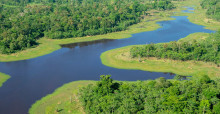Hírek a nagyvilágból
 >
>
2022/024: Date, Venue, and Deadlines Concerning the Third Meeting of Signatories to the Raptors MOU
The Coordinating Unit of the of the Memorandum of Understanding on the Conservation of Migratory Birds of Prey in Africa and Eurasia (Raptors MOU) wishes to share the f
2022/023: Nomination of Candidates for the COP-Appointed Councillor Subject Areas of Aquatic Mammals and Climate Change
Through this Notification the Secretariat is seeking nominations for suitable candidates for the COP-appointed Councillor subject areas of Aquatic Mammals and Climate C
High-Level Segment - UN Biodiversity COP15: Statement from CMS Executive Secretary
HIGH-LEVEL SEGMENT
UN BIODIVERSITY CONFERENCE
15-17 December 2022, Montreal, Quebec, Canada
Statement
Opinion: COP15 - We are Losing Nature – Biodiversity – at the Fastest Rate in Human History
The 15th Conference of the Parties (COP15) to the United Nations Convention on Biological Diversity (CBD), an international meeting bringing together governments from around the world, will set out new goals and develop an action plan for nature over the next decade. The conference will be held in Montréal, Quebec, the seat of the UN CBD Secretariat, from December 7 – 19, 2022.
CBD COP15 Opening Statement of CMS Executive Secretary on behalf of the Liaison Group of Biodiversity-related Conventions (BLG)
World Migratory Bird Day 2023 to Focus on Water
We are pleased to announce that next year’s World Migratory Bird Day campaign will focus on the topic of water and its importance for migratory birds. Water is fundamental to life on our planet. The vast majority of migratory birds rely on aquatic ecosystems during their life cycles. Inland and coastal wetlands, rivers, lakes, streams, marshes, and ponds are all vital for feeding, drinking, or nesting, and also as places to rest and refuel during their long journeys.
2022/022: Updated CMS Secretariat Recommendations for the Current Text of the Draft Post-2020 Global Biodiversity Framework
2022/021: CMS COP14 Dates, Venue and Deadlines
The CMS Secretariat is pleased to announce the dates of the 14th Meeting of the Conference of the Parties (COP14).
2022/020: Call for Financial Support for the Development of a New Strategic Plan for Migratory Species
2022/019: Revised Format for CMS COP14 National Reports
Pursuant to Resolution 12.5, Parties to the Convention on the Conservation of Migratory Species of Wild Animals (CMS) are to submit their national reports six months pr




